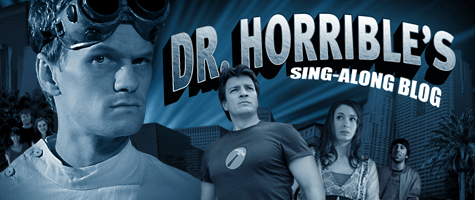
The first episode of Joss Whedon’s writers’ strike project, Dr. Horrible, goes live on teh interwebz tomorrow. Since one whiff of any Joss Whedon project is enough to turn most of the OTI bloggers into snarling, prosthetic-foreheaded vampires, consider this a pubic service announcement.
Trailer video and provocative resolution for discussion and debate after the jump.
So, OK, use the comments to argue about this statement: Resolved, Joss Whedon is the Aaron Sorkin of sci-fi/fantasy.
Yeah, you’re right. Sorkin and Whedon are basically the same person. The only difference is that Whedon seems a bit more pessimistic than Mr. Idealism Sorkin–but then again that’s based mostly on Firefly, since I’ve seen very little Buffy and no Angel.
What I want to know is, why did these two creator/writers get super famous but other ones don’t? In other words, why did I know the name “Joss Whedon” since Buffy started but don’t I know the name of the guy who made up Heroes? I love Rome, but I can’t tell you who wrote it. What’s the deal?
Let me admit my ignorance right up front, not having seen either show. However, if a blog’s comments page isn’t the place to pull totally baseless pontification out of your ass, I don’t know what is.
Thus disclaimed, let me suggest
With both of those shows you have a really unique (That’s a West Wing reference. Anyone? Anyone?) and fresh voice that finds itself married with EXACTLY the right source material — and at EXACTLY the right time (90’s gen-X self referential irony in one case, millennial liberal wish fulfillment in the other).
Judging solely from the press coverage, let me suggest neither Rome nor Lost were ENTIRELY pathbreaking the way that Buffy and West Wing were.
Rome has kind of disappeared, though LOST was a phenomenon — though isn’t it just a stronger version of the X-Files, except minus the FBI procedural?
(Yeah, yeah… lots of people are going to comment about all the antecedents and prove that I don’t know what I’m talking about. Whatever. Bite me.)
People do generally know that Lost and Alias (and a number of less successful projects) are by JJ Abrams, though. Or do they? Maybe I’m just a nerd.
I will say, though, Sorkin and Whedon both inspire a certain fanboyish devotion that even the other “household name” TV writers (Abrams, maybe X-Files’ Chris Carter, Mitchell Hurwitz in some circles) simply don’t recieve.* I’m going to suggest that it has to do with their particular brands of stylized dialogue. There’s a signature JJ Abrams “brand,” but it has to do with narrative issues: with long running (and ultimately disappointing) quasi-mystical plots. Nothing about the language itself screams “Abrams!” Whereas with Whedon and Sorkin, there’s an immediately identifiable way that the characters talk. Obviously they didn’t write every line of dialogue themselves (except for when Sorkin, in an orgasm of cocaine-fueled hubris, totally did) but they managed to get the writers room to create a totally unified speech-world for their characters. Fanboys like to go on about how all of the characters on Buffy have their own voices – that you could take any of the lines out of context and still know which character it comes from. Maybe that’s true. But Xander and Willow still talk WAY more like eachother than like regular human beings.
The Whedon style seems to be mostly a matter of using the least direct possible way of expressing a sentiment, and occasionally chopping words up into their component parts for comedic effect. (“Okay, is anyone else finding this whole writing style a little… circumlocutiony?” “It’s fairly circumlocute.” “There’s some definite circumlocutionage.” “So… let’s hit the Bronze?”)
Again, with Sorkin, there are speeches that could not have come from anybody else. Like Whedon, he will never use two words when twenty will do, although in his case the filler usually comes from two people going back and forth, usually in one of his famous walk-and-talks. (“We’ve got a problem.” “What do you mean we?” “Well, I’ve got a problem.” “With the dialogue?” “With the dialogue.” “Not my problem.” “Well, since you work for me -” “*With* you.” “Since you work with me, my problems become your problems.”) And then occasionally he does one of those starry-eyed idealist speeches, which I’m not even going to try to reproduce here, but if you’ve seen the shows you know what I mean.
Artists and art historians make a distinction between “linear” painters (Michelangelo, Ingres), who try to hide their technique as much as possible; and “painterly” painters (Van Gogh, Seurat), who make their technique as noticeable as possible. I guess what I’m saying is that Whedon and Sorkin get the fanboy love because they are such emminently “writerly” writers.
* The only other person I can think of who gets this kind of devotion is Gene Roddenberry, which I think is just a matter of the Trekkies feeling the need to be WAY more intense than all the other dorks in the room.
Dear Jordan,
1. You get an imaginary Internet cookie for making me burst out laughing at your dead on Whedon and Sorkin dialogues. Nice.
2. When I asked Carlos this question, his answer was, “Gene Roddenberry, too!” So you aren’t the only one who thought that. (Nerds.)
3. Sorkin does the walk-and-talk, the starry idealist speeches, AND the “yelling at God in Latin while tossing a cigarette on the ground at the National Cathedral” speeches. Don’t forget.
Yours,
Shana
Let me add Babylon 5’s J. Michael Strazyin.. er Stracyin.. er (one google later) J. Michael Straczynski to the list. When Babylon 5 came out in the early ninties, it was the only Sci-Fi TV show I can think of that garnered anything like a “Star Trek” level of fanboyism.